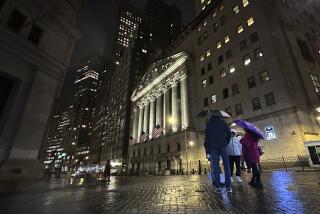Global Stocks Up; Dollar Sinks
Skeptical markets drove the dollar to another all-time low Thursday against the euro, with the European currency climbing to $1.324 in late-day trading, from $1.318 on Wednesday.
Stocks rose in Tokyo and on almost all Western European exchanges, albeit in lighter-than-usual trading with U.S. financial markets closed for the Thanksgiving Day holiday. Oil prices were little changed in London.
The current dollar slide is driven primarily by concerns over the U.S. trade and budget deficits. Though a weekend meeting of the finance officials from the Group of 20 industrial and developing countries failed to deliver any signal of concerted action to stem the tide, economists say no specific event is pushing the U.S. currency down this week.
“It’s just anti-dollar sentiment,” said Lee Ferridge, chief currency strategist at Rabobank in London. “The trend is continuing. I think it should slow before long, but we might see $1.35 before it happens.”
Many analysts are predicting the euro could hit $1.40 by the middle of next year. European Central Bank President Jean-Claude Trichet recently called the increase “brutal.”
The dollar was at its lowest levels against the Japanese yen since December 1999 on Thursday, buying 102.61 yen.
The dollar’s current weakness has been helpful to U.S. exports, making American products less expensive overseas, but European leaders have begun to worry openly that it might damage their fragile export-driven economic recovery.
The strong euro puts pressure on manufacturers of products such as German luxury cars or French wines. Either their dollar prices will rise or the companies must live with lower profits.
“The renewed strength of the euro is probably the most immediate risk to the euro area economy, weakening exports even further,” said economist David Owen at Dresdner Kleinwort Wasserstein, adding that domestic demand remained too weak to offset this trend.
European stock investors, however, seemed to shrug off the euro’s rise Thursday, with benchmark indexes climbing in all 18 Western European markets except Ireland.
Here is a roundup of major world stock markets Thursday:
* Big gains by oil majors BP and Shell propelled Britain’s benchmark FTSE 100 index to a higher close, but retailer Tesco stole the limelight after reporting higher sales and bank Barclays fell after a trading update. The FTSE 100 closed up 34 points, or 0.72%, at 4,753.4.
* The FTSEurofirst 300 index of pan-European blue chips ended 0.7% higher at 1,030.2 points, only 1% below Monday’s 28-month peak.
* Germany’s DAX index ended at 4,160.35 points, up 35.05 points, or 0.85%, and the French CAC-40 index closed at 3,797.59 points, up 36.89 points, or 0.98%.
* In Asia, Tokyo’s Nikkei average rose 28.01 points, or 0.26%, to 10,900.34. But Hong Kong’s Hang Seng index fell 0.5%, or 70.41 points, to 13,926.61.
More to Read
Inside the business of entertainment
The Wide Shot brings you news, analysis and insights on everything from streaming wars to production — and what it all means for the future.
You may occasionally receive promotional content from the Los Angeles Times.










